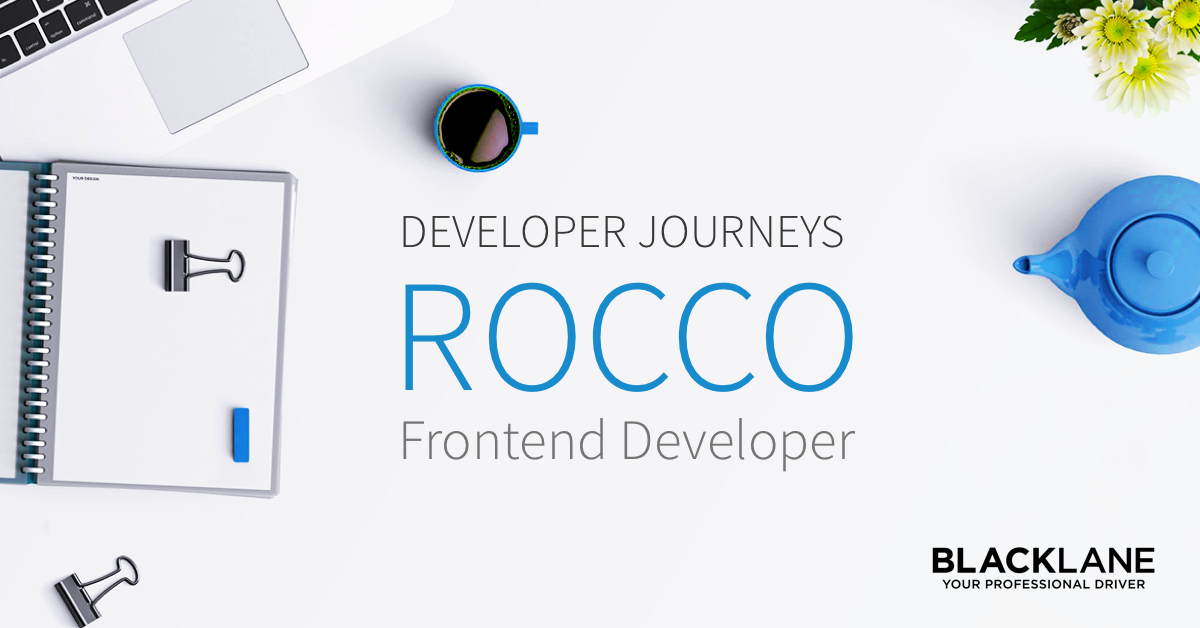This month, we’d like to introduce you to Rocco. Rocco is a Frontend Brigand (what his signature says), aka a Senior Frontend Developer (what HR and all the official docs say). He first joined Blacklane in October 2015 and left in September 2017. Then, he repented himself and came back in May 2018.

Where are you from, and what is your minimum viable autobiography?
I was born 31 years ago in Avellino, a rather unknown province of southern Italy. I started playing with the web when I was 13 or 14—that’s when I got access to that internet thingy; my parents still complain about those huge phone bills. I also did some radio back at uni as a technician, definitely not as a DJ, but it was still super fun for me!—a bit less for my pockets though, since that’s when I started collecting audio CDs for real. I’m up to 200 right now, I think.
After two years at uni (computer science), I left because I felt quite bored and not willing to take math/physics classes. I moved up north to work, to the lovely city of Bologna: that’s where I started getting paid to break websites (and to fix them right after that… most of the time). I also started organizing front-end conferences (or conferences for front-end folks, to be more precise) under the “From the Front” name. I’m now working on the follow-up to that project, which will be called “Red Threads.”
I’ve been in Berlin doing the same now, since 2013.
When did you realize you wanted to write code for a living?
It was, more or less, when I got bored of my university degree at the end of my second year. I started looking around for interesting companies to work with after a very nice (one of the few, sadly) software engineering class. The other option was to go on for my third year at uni and get bored with lots of math (and physics) books. Not really my thing, I’m afraid. There were no pixels to move around in those classes.
What brought you to Blacklane originally, and why did you decide to come back?
Things were not going that well with my previous company, so I decided to move on and find something more challenging. I ended up here at Blacklane, beefing up the front-end team that was only three people at the time.
The coming back part happened after some troubled months and due to many important changes Blacklane’s Engineering department went through, and also because of a nice opportunity that was presented to me to work on something to be built from scratch. Definitely a fun thing to do.
As a developer, how do you feel about living and working in Berlin?
Working in Berlin is cool: it’s a vibrant city with lots of things to do and see outside of work. Then, you might get lucky and find a good bunch of colleagues. I’m in my fifth year here, and while I enjoy the springs and summers, I’ve started having some issues adapting myself to Northern European winters. It’s not fun for a Southern European having just 25 hours of sun in a whole month. That means filling myself up with Vitamin D pills. And/or going down to the Canary Islands for a while and working from there.
Why do you enjoy staring at a screen for hours and hours every day, manipulating symbols that tell a machine what to do?
I like automating things. And while I’m at it, I also enjoy the idea of making this automation look beautiful so people might actually enjoy it. I think it’s because I am in this weird place between being a designer and a developer. I am the designer among devs and the dev among designers. I don’t belong to either of these categories. I like automating things for designers, because many of them don’t know how to do it. Everything they do is manual. For example, what they know is that there is a small size for screens, and there is a big size for screens—but what about what’s in between? And many devs don’t have any idea about design, like what a clean web page should look like. Trying to match these things is an interesting challenge.
How do you find working on a team versus working alone?
There are pros and cons on both sides. I do enjoy working in a “quiet” environment (that could also be a busy train station, if you are working on something cool) by myself, although being part of a team helps a lot as having an extra pair or two of eyes to catch bugs definitely benefits the final outcome.
Do you have any favorite languages, technologies, or frameworks? What do you like about them? Are there any that you secretly despise?
I don’t particularly like hype. Entering the hype loop and seeing that super fancy lib/tool/framework crushed by its lack of maintenance after three months is something I wouldn’t want to go through (again).
I’ve been following the micro-frameworks train for a long time. I never really liked jQuery, nor Native Apps (I still believe they’ll soon become PWAs, that’s web-based “apps”). I’ve always been a huge lover of specs and of responsive, adaptive, websites.
My current new, shiny toys are static websites, Flow, Parcel, CSS Modules, and, to a lesser extent, React. I’m also catching up with JSON APIs and JSON Schemas.
What are you looking for in a company when you’re considering a job? What is most important to you, and what is least important?
Many things are on my checklist, like, for instance: a good team spirit, being able to leave a mark, following a sound set of ethical principles, having room to learn more, and especially a diverse and accepting environment. But I crave learning. I’m like a sponge.
That’s ironic considering your experience at university. Why do you think it didn’t work for you? What does work for you?
The problem is the mindset. The things we were taught at university were useless to me. How it’s structured in Italy—computer science—it’s three years, 26 exams. 12 of them were about math. There was (and maybe still is) one, single course in the third year about the web. JavaScript, PHP, and CSS all together. One exam. And everything is stuck at ten years ago, so it’s super useless, too. And I suck at math. Like a lot. With anything having to do with computer science foundations and stuff like that, I did great. With math, I only took one exam. Physics, I didn’t even try. It was way beyond my knowledge and willingness to learn those things. I knew I would never use it.
I crave learning things I might actually use, like things having to do with the web. I feel like a craftsperson on the web: I care about functionality first of all, then usability, and then, possibly, I like to sprinkle some aesthetics on top of it.
What role do developers have in the world, do you think? Are we just passive code robots, or do we have responsibility for the impact of our work on society?
We are actually in the middle of a huge change. Think of Facebook and Cambridge Analytica, for instance. I believe developers need to act in the most ethical way, putting themselves in their users’ shoes. That would also mean stepping up and fighting against weird, shady behavior, such as collecting data without letting your users know, or not giving the chance to everybody to access your website: have you ever tried navigating a website without a mouse or keyboard, or not identifying yourself as “Mr.” or “Mrs.”? Not everyone can or wants to do those things.
How can developers balance the imperative to act ethically with the needs of the businesses they work for? Is this a contradiction we need to live with, or do you think there are ways of resolving it?
Personally, I would never join a company whose core business is collecting data. And I would quit immediately if I were asked to do anything like that. You should just refuse to do those things: there are plenty of other options in the developer market these days that may be more in line with your ethical values! It doesn’t matter how much money they want to pay you. For instance, the guy who wrote the algorithm for Cambridge Analytica: I believe he’s also responsible for what happened. He said he regrets what he did and that’s great: better late than never. But I can’t get it out of my head that his move has been a way for him to get even more money out of his questionable past.
Another example of acting ethically is accessibility: for instance, not everyone can use a mouse and a keyboard and see what’s happening on their screen. And it takes very little for a developer to leave a mark and actually care about humans by giving them a decent user experience, rather than following the “it works for me!” principle—“you” and “me” is not everyone. Quite often, I’ve seen developers (me included, sometimes in the past) using fancy, new tech to replace old, but functioning, solutions—like JavaScript onClick handlers instead of regular links. By using such solutions, you can easily make your website inaccessible, and why? Just because you want to adopt a cutting edge solution. New is not always a synonym for better.
If you could change one thing about JavaScript or frontend development, what would it be and why?
I think we’re going in the right direction as a community. We’re quite open to changes, new things, new ideas, diverse people. Sure, there’s still a lot of bias against underrepresented groups. That cannot be denied. But we’re working on it. We shouldn’t stop working on it, and we should speak out whenever we see things that suck pretty badly. Two quick examples: the gender pay gap and conference lineups full of white-male-straight-alpha geeks.
About the pay gap, I think that things are moving quite quickly. At least, that’s what I can see at Blacklane: we’re taking measures to tackle this issue seriously and in the fastest possible way. I can’t understand why the same skill set should be paid differently based on a person’s appearance. Why not pay people who wear tank tops and open shoes more, in that case? Isn’t it the same thing?
About conference lineups: I’ve been organizing “From the Front,” a series of conferences for front-enders, for six years. Even though it’s organized in Italy, where the diversity ratio in the industry is kinda bad, we always managed to have at least an even male/female ratio, welcoming speakers and attendees from all around the world, people with the most inconvenient dietary preferences, people who are strictly religious (and not religious at all), old people, young people, people with kids, people without kids… everything, really—except for fascists and racists (the few racists we spotted were kicked out of the venue, for obvious reasons).
The most amazing thing? We did not do that on purpose. We just set the right tone and environment, where pretty much everybody felt welcome, no matter what. We do a blind call for papers, to which even seasoned speakers have applied, and the outcome has always been highly appreciated by everyone who attended.
What is it like working in a different country, and culture, than the one in which you grew up?
It is sometimes challenging: things that I would have taken for granted back in Italy, they are not like that here. Working styles differ, so especially as a newbie you might look like the weird person. That’s absolutely fine, I think. With time, it gets fun so we can all start laughing about these differences, and you can start to realize how messed up the discussions going on in your own country are about immigrants (or expats, if you’re an educated white European/North American… that’s the difference, right?).
What do you imagine about your future? Where do you see yourself many years from now, and what do you hope to have accomplished?
Coding on a beach somewhere in Southern Europe (or South America) with a bunch of dogs, my boyfriend, and an avocado plantation. Not sure about what I could accomplish in the future: it’ll be a pleasant surprise. Fingers crossed.
—
At Blacklane, we have a diverse and growing engineering team. Every month, new faces appear among us, often adding to the long list of countries that are represented here. We started this interview series, because we wanted to give our developers an opportunity to tell us about their background, share their interests, and answer the question, “How did you end up at Blacklane?” We figure everyone has a story to tell, and since Blacklaners come from all over the world, and more and more work all over the world, it’s fascinating to hear about what brought them to our company.


